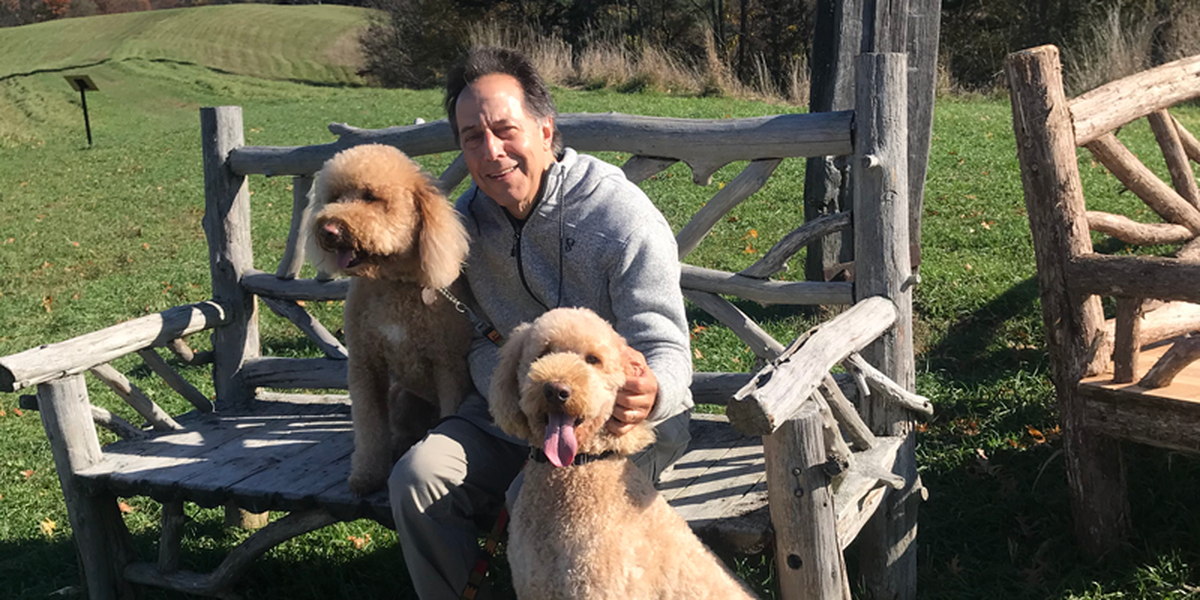
Russell Rothman (M.S. Ecology, ’77) says his love of science began in the halls of the American Museum of Natural History in New York when he was a child. His mother often took him along on her trips into the city (a reward for being good), where she took opera lessons near the museum. Those days wandering through his favorite sections—mammals, dinosaurs, and archeology—launched the boy from Teaneck, N.J., into an education that brought him to northern Minnesota to track wolves with U of M adjunct professor L. David Mech and then to Israel, where he extended his research in the Negev Desert as part of his Ph.D. research.
Rothman’s professional life diverged from his early passion for science when he joined his father and two brothers at the family’s consumer electronics distribution company, but his support for ecology education and wildlife conservation has continued. He serves as co-chairman of the American Society for the Protection of Nature in Israel, is board chair of Alzheimer’s New Jersey, serves on the CBS Campaign Steering Committee, and established the CBS Florence Rothman Fellowship, in honor of his mother.
Growing up in the 1960s, Rothman saw ecology come to the forefront, and as he planned his college education, he wanted to learn more. “I thought, maybe I’ll become an architect, but I’ll have an environmental background and I’ll apply it to the work that I’ll do,” he says. He enrolled at Carnegie Mellon University in Pittsburgh, but after a year Rothman transferred to Washington University in St. Louis. There, he had planned to continue his studies in architecture—until he had an unexpected encounter with a rhinoceros.
Rothman was on an insider’s tour of the St. Louis Zoo, when he found himself a little too close to a rhino that apparently decided to mark its territory. “A rhino pees like a firehose,” he laughs. “I was drenched.”
Drenched, but curious. He recalls peppering the zookeeper with questions about why the rhino did what it did. Soon, he was enrolled in an animal behavior class, where he met Michael Fox, a psychology professor who brought his pet wolf into class to demonstrate aspects of animal behavior. “I was hooked,” he says.
Rothman met Mech at an international wolf conference in St. Louis, and Mech encouraged him to come north. Rothman enrolled in a master’s program in ecology at the U in 1974 and began working in Ely with Mech. After completing his master’s work on scent marking and pair formation, he headed to Israel to continue his research. “In Israel, I would be able to see what forces are in play promoting social behavior because wild animals there have little fear of people due to the absence of hunting. I could get close to wolves and other carnivores and observe them at close range without interference.”
He stayed in a field station operated by the Society for Protection of Nature (SPNI) near the Jordanian border and teamed up with military troops who took him out on their border patrols. While the soldiers looked for human tracks, Rothman looked for animal tracks.
“We’d see wolves and jackals, foxes, hyenas, and occasionally a wild cat or a caracal. There was just a lot out there,” he says. He was given cow carcasses from nearby farms and created feeding stations to draw animals and allow him to study their behavior.
Rothman had married just six months before heading to Israel. His wife, Nina, worked for an airline and chose not to join him except for a visit a few months into his work. When Nina arrived in Israel, the couple spent a couple of days in Tel Aviv and Jerusalem before taking a bus to the field station in the desert. “We get off at our stop,” Rothman says, “and the bus pulls away and there’s a cloud of dust, and we’re waiting for the dust to settle before we cross the road, and my wife sees these old barracks surrounded by a barbed wire fence, with a guard tower and a guard at the gate with an Uzi, because we are less than a mile from the Jordanian border. . . . Her jaw just dropped.”
Nina got the chance to witness wildlife up close at one of Rothman’s feeding stations before she headed back to her job with the airline. A few weeks after she left, she sent a telegram to Rothman announcing she was pregnant. Then he got two more: one from her parents and one from his saying, “Go home.” He did.
Back in Minnesota, Rothman continued his Ph.D. studies but struggled to obtain the funding to continue his research. He, Nina, and their growing family moved out east as he took a job with his family’s company.
Rothman says he’d always wanted to give back to the U. “Those years with the university are probably the most fun and stimulating times of my life,” Rothman says. (They included a brief stint as the anonymous creator of the satirical EBB Newsletter, which appeared two or three times a year in people’s mailboxes, the result of a stealth printing job in the offices of the Bell Museum late at night. “I didn’t admit to this until Bud Tordoff [former head of the Bell] passed away,” Rothman says.
In 1996, Russell and Nina established the Florence Rothman Fellowship to help first- and second-year grad students who need seed money start their research. It was a grant from the J.W. Wilkie Fund that got Rothman over the hump for his master’s research, he says. “I know how important it is to be able to initiate the research with a little help.” —Kristal Leebrick